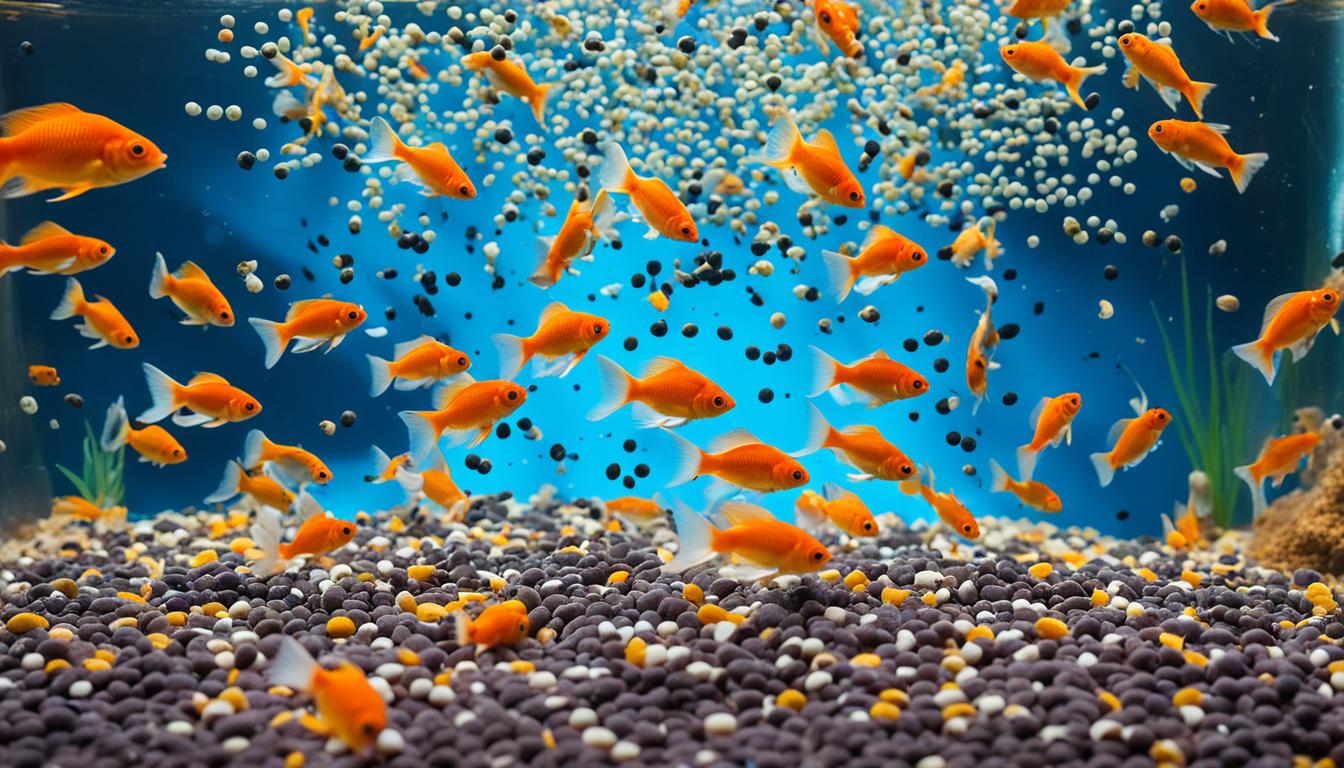Last Updated on 3 months by admin
Welcome to our latest article where we explore whether it’s safe and beneficial for tropical fish to eat goldfish food. Many fish enthusiasts have wondered if their tropical fish can enjoy the same food as goldfish. Let’s dive in and discover the truth!
Goldfish food is specifically formulated to meet the unique nutritional needs of goldfish, which are coldwater fish. Tropical fish, on the other hand, have different dietary requirements and require food designed specifically for their needs. While tropical fish can occasionally eat goldfish food, it is not recommended as their primary diet.
It’s important to provide tropical fish with a balanced and varied diet that includes a mix of proteins, carbohydrates, vitamins, and minerals. This ensures their overall health, growth, and vibrant colors. Feeding your tropical fish goldfish food on a regular basis can lead to nutritional deficiencies and health problems.
Key Takeaways:
- Goldfish food is formulated for the specific nutritional needs of goldfish, not tropical fish.
- Feeding tropical fish goldfish food can lead to nutritional deficiencies and health problems.
- Tropical fish require a balanced and varied diet to thrive.
- Consult with a fish expert or veterinarian to determine the best diet for your specific tropical fish species.
- Provide tropical fish with food designed specifically for their nutritional needs.
Can Your Tropical Fish Occasionally Eat Goldfish Food?
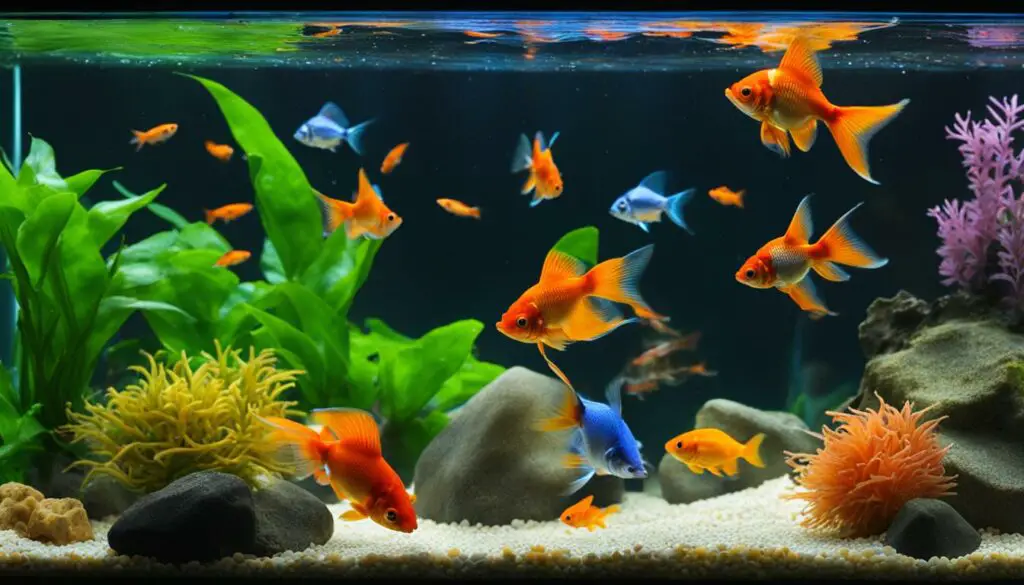
While tropical fish can occasionally eat goldfish food, it is important to note that goldfish food does not provide the necessary nutrients for their optimal health and growth. Goldfish food is formulated with ingredients that meet the specific dietary needs of goldfish, which have a primarily plant-based diet. Tropical fish have different nutritional requirements and need a more varied and balanced diet to thrive.
Unlike goldfish, tropical fish require a combination of proteins, carbohydrates, vitamins, and minerals to support their vibrant colors, growth, and overall well-being. Their diet should include high-quality fish food that is specifically formulated for tropical fish nutrition.
| Tropical Fish Nutrition Needs | Goldfish Food |
|---|---|
| Proteins | Primarily plant-based ingredients |
| Carbohydrates | Low in carbohydrates |
| Vitamins and minerals | May lack essential vitamins and minerals for tropical fish |
Tropical fish also benefit from a more varied diet that includes a mix of pellets, flakes, freeze-dried or frozen foods, and even fresh fruits and vegetables. Providing a diverse range of food ensures that tropical fish receive a well-rounded nutritional profile.
While it may be tempting to occasionally offer goldfish food to your tropical fish, it should not be their primary source of nutrition. Always opt for food specifically designed for tropical fish to promote their optimal health and longevity.
Is It Safe To Give Your Tropical Fish Goldfish Flakes?
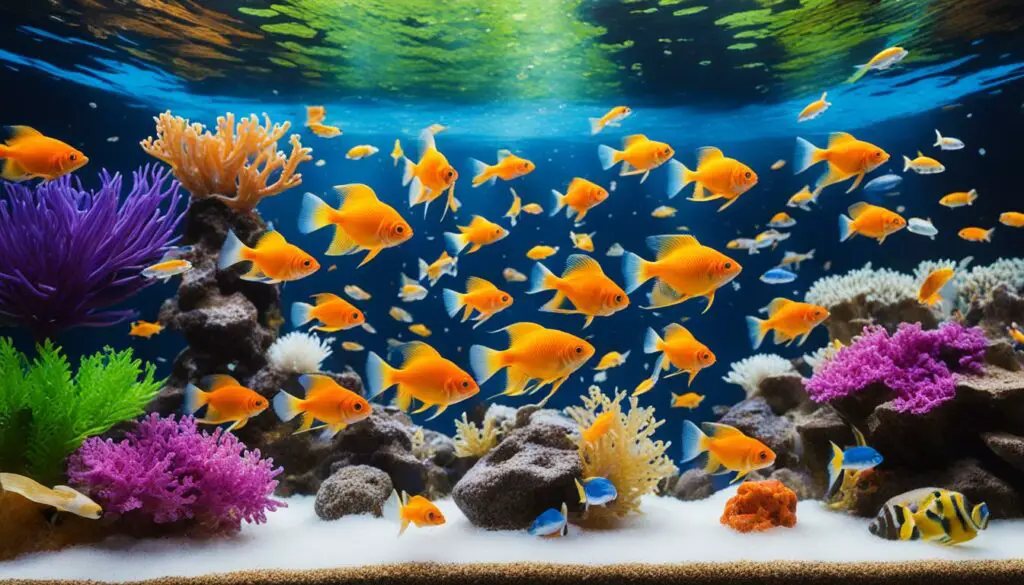
While it is generally safe to give your tropical fish goldfish flakes as an occasional treat, it is not recommended as their main diet. Goldfish flakes may not contain the necessary nutrients that tropical fish need to stay healthy. It is best to provide your tropical fish with food specifically formulated for their nutritional needs.
While goldfish food is designed to meet the dietary requirements of goldfish, it may not provide the essential nutrients that tropical fish require to thrive. Tropical fish need a well-balanced diet that includes a mix of proteins, carbohydrates, vitamins, and minerals to maintain optimal health.
Feeding your tropical fish goldfish flakes as their primary food source can potentially lead to nutritional deficiencies and health problems. It is important to choose suitable food for your tropical fish to ensure they receive all the necessary nutrients for their growth and well-being.
Instead of relying on goldfish flakes, consider feeding your tropical fish a diet formulated specifically for their species. Look for high-quality fish food that is suitable for the nutritional needs of tropical fish. These foods are usually labeled as “Tropical Fish Food” or specify the particular fish species they are formulated for.
By providing your tropical fish with the right food, you can help support their overall health and vitality. Consult with a fish expert or veterinarian for guidance on the appropriate diet for your specific tropical fish species to ensure they thrive in your aquarium.
Benefits of Providing Suitable Food for Tropical Fish:
- 1. Ensures optimal nutrition for tropical fish.
- 2. Promotes healthy growth and development.
- 3. Reduces the risk of nutritional deficiencies.
- 4. Enhances the immune system.
- 5. Enhances colors and patterns in fish.
What Happens if You Feed Your Tropical Fish Goldfish Food?
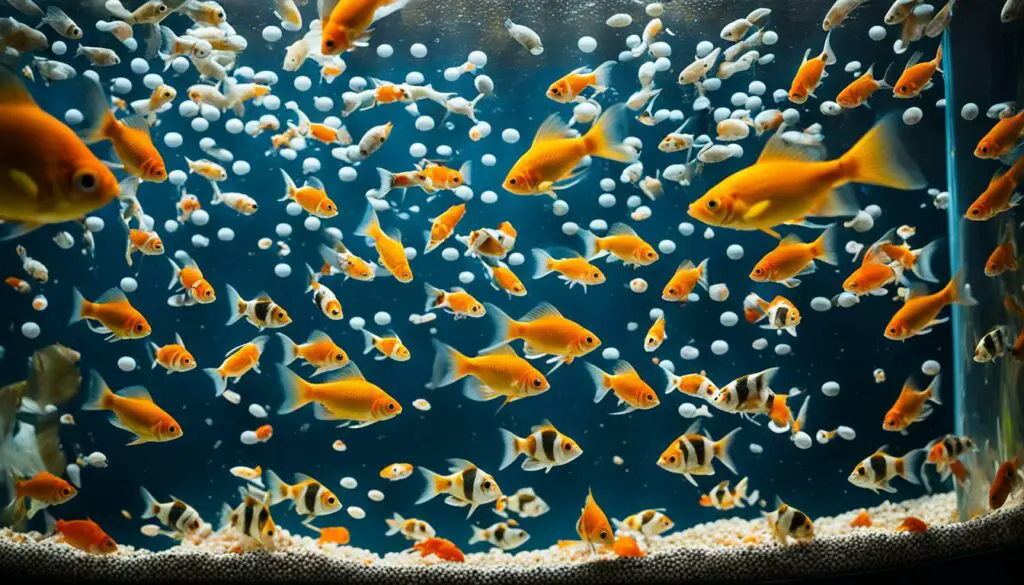
Feeding your tropical fish goldfish food on a regular basis can lead to nutritional deficiencies and health problems. Goldfish food is formulated with ingredients that cater to the needs of goldfish, which are different from those of tropical fish. If you feed your tropical fish goldfish food exclusively, they may not receive the right balance of nutrients and can become malnourished over time.
Tropical fish have specific nutritional requirements that differ from those of goldfish. They need a diverse and well-balanced diet to thrive and stay healthy. Goldfish food may lack essential nutrients, such as certain vitamins and minerals, that tropical fish need to support their growth, immunity, and overall well-being.
When tropical fish are consistently fed goldfish food, they may experience various negative effects on their health. These can include:
- Stunted growth: The lack of essential nutrients in goldfish food can hinder the growth and development of tropical fish.
- Weakened immune system: Insufficient nutrition can compromise the immune system of tropical fish, making them more susceptible to diseases and infections.
- Color loss: Tropical fish require specific nutrients to maintain their vibrant colors. Inadequate nutrition can result in faded or dull colors.
- Organ damage: Nutritional deficiencies can lead to organ damage in tropical fish, affecting their overall health and lifespan.
It’s essential to provide your tropical fish with a diet that meets their specific nutritional needs. Opt for high-quality tropical fish food that is specially formulated to provide the necessary nutrients for their well-being. Look for food that offers a balanced mix of proteins, carbohydrates, vitamins, and minerals.
Expert Insight:
“Feeding tropical fish goldfish food as a primary diet can have detrimental effects on their health. Goldfish food lacks the essential nutrients that tropical fish need to thrive. It’s crucial to understand the nutritional needs of your fish and provide them with the appropriate diet to ensure their long-term health and well-being.”
– Dr. Sarah Johnson, Aquatic Veterinarian
By prioritizing the nutritional needs of your tropical fish and offering them a diet specifically designed for them, you can promote their overall health, vitality, and longevity. Ensure you consult with a fish expert or veterinarian to determine the best feeding regimen for your specific tropical fish species.
Key Differences Between Tropical Fish and Goldfish Nutritional Needs
| Tropical Fish | Goldfish |
|---|---|
| Require a varied and balanced diet | Primarily vegetarian diet |
| Need specific nutrients for vibrant colors | Less emphasis on color enhancement |
| Benefit from higher protein content | Lower protein requirements |
| Nutritional needs vary among species | Have more uniform dietary requirements |
Can You Raise Tropical Fish and Goldfish Together in the Same Tank?
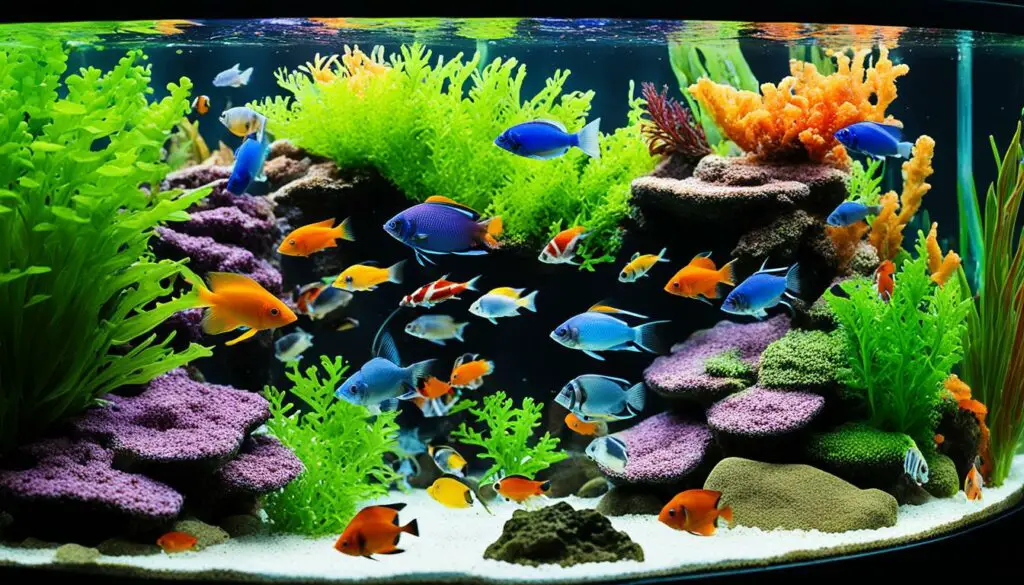
When it comes to mixing tropical fish and goldfish in the same tank, it is important to consider their different dietary requirements. Goldfish are coldwater fish that thrive on specific nutritional needs, while tropical fish have their own unique dietary needs. To ensure the optimal health and growth of both species, it is essential to provide each with the appropriate food.
Tropical fish require a varied diet to meet their nutritional needs. Feeding them a diverse range of foods helps support their growth, coloration, and overall well-being. Offering a mixture of high-quality pellets, flakes, freeze-dried or frozen foods, and even fresh fruits and vegetables ensures that tropical fish receive the necessary proteins, carbohydrates, vitamins, and minerals.
Goldfish, on the other hand, have specific nutritional requirements that are met by goldfish food formulated exclusively for their needs. This specialized food provides the necessary proteins, carbohydrates, and other nutrients that cater to the specific dietary needs of goldfish. While tropical fish can occasionally eat goldfish food, it should not be their primary diet as it may not provide the complete range of nutrients they require.
“Feeding your tropical fish a varied diet is essential for their optimal health and growth.”
To ensure the health and well-being of both tropical fish and goldfish in the same tank, it is recommended to follow these guidelines:
- Provide each species with the appropriate food formulated for their nutritional needs.
- Offer a combination of high-quality pellets, flakes, freeze-dried or frozen foods, and fresh fruits and vegetables to meet the dietary requirements of tropical fish.
- Feed goldfish with specialized goldfish food that caters to their specific nutritional needs.
- Avoid relying solely on goldfish food as the main diet for tropical fish.
By providing a well-balanced and appropriate diet for each species, you can ensure the optimal health and growth of both your tropical fish and goldfish in the same tank.
| Tropical Fish | Goldfish |
|---|---|
| Require a varied diet | Specific nutritional requirements |
| Need proteins, carbohydrates, vitamins, and minerals | Require nutrients provided by goldfish food |
| Benefit from pellets, flakes, freeze-dried or frozen foods, and fresh fruits and vegetables | Thrive on goldfish food formulated for their needs |
| Varied diet promotes growth, coloration, and overall well-being | Specialized food meets their specific dietary needs |
What Food Should You Give to Your Tropical Fish?
Tropical fish require a specifically formulated diet that meets their nutritional needs. It is essential to choose high-quality fish food that provides a balanced mix of proteins, carbohydrates, vitamins, and minerals. By selecting the right food, you can ensure the optimal health and well-being of your tropical fish.
When choosing fish food for your tropical fish, look for options that are specifically designed for their dietary requirements. Here are some recommended food types:
- Pellets: Pelleted fish food is a popular choice for tropical fish. They come in different sizes and are easily consumed by fish of all sizes. Pellets are formulated to provide a well-rounded diet, containing essential nutrients and vitamins.
- Flakes: Flakes are another common and convenient option for feeding tropical fish. They offer a variety of flavors and can be used as a primary food source or as a supplement to other food types.
- Freeze-dried or frozen foods: These foods provide a natural and nutritious diet, offering a great source of protein. Options include freeze-dried bloodworms, brine shrimp, and daphnia. These foods can be fed as occasional treats or as part of a varied diet.
- Fresh fruits and vegetables: Supplementing your tropical fish’s diet with fresh fruits and vegetables can provide additional nutrients. Options such as peas, spinach, and cucumber can be blanched and offered in small quantities.
Consulting with a fish expert or veterinarian can help you determine the best food options for your specific tropical fish species. They can provide valuable guidance on the ideal diet to promote optimal health and growth.
Remember, maintaining a balanced and varied diet is essential for the well-being of your tropical fish. Take the time to research and choose the right food for your fish to ensure they receive the nutrition they need.
Sample Table: Recommended Food Options for Tropical Fish
| Food Type | Description |
|---|---|
| Pellets | Specifically formulated to provide a well-rounded diet, containing essential nutrients and vitamins. |
| Flakes | Convenient option that offers a variety of flavors and can be used as a primary food source or as a supplement. |
| Freeze-dried or frozen foods | Natural and nutritious options that provide a great source of protein, can be fed as occasional treats or as part of a varied diet. |
| Fresh fruits and vegetables | Supplementing the diet with fresh fruits and vegetables can provide additional nutrients and variety. |
Can You Feed Tropical Fish With Betta Food?
While it is possible to feed tropical fish with betta food, it is not recommended as their main diet. Betta food is specifically formulated for the nutritional needs of betta fish, which may not align with the requirements of other tropical fish species. To ensure the optimal health and well-being of your tropical fish, it is important to provide them with food designed for their specific dietary needs.
Tropical fish, like bettas, require a balanced diet to thrive. Their nutritional needs vary based on factors such as species, size, and activity level. Feeding them a diet that meets their specific requirements is crucial to support their growth, vibrant colors, and overall well-being.
While betta food may seem like a convenient option, it may lack the necessary nutrients that tropical fish need. These fish require a diet that consists of proteins, carbohydrates, vitamins, and minerals. A well-rounded diet helps promote strong immune systems, healthy metabolisms, and proper growth. Depending on the species, some tropical fish may also require specific nutrients like algae or higher protein content.
Therefore, it is best to opt for commercial tropical fish food that is specifically formulated to meet their nutritional needs. These foods are often available in various forms such as pellets, flakes, and freeze-dried or frozen options. They offer a well-balanced mix of nutrients that are essential for the health and vitality of your tropical fish.
The key to maintaining healthy tropical fish is to provide them with a varied and nutritious diet that mimics their natural feeding behaviors.
By choosing the appropriate food for your tropical fish, you can ensure they receive the necessary nutrients while promoting their overall well-being. Remember to consult with a fish expert or veterinarian for specific dietary recommendations based on the species of tropical fish you are keeping.
| Tropical Fish Nutrition | Recommended Foods |
|---|---|
| Protein | High-quality fish pellets or flakes with a protein content ranging from 40-50% |
| Vitamins and Minerals | Supplemental foods such as freeze-dried or frozen brine shrimp, bloodworms, or daphnia |
| Carbohydrates | Some tropical fish benefit from the inclusion of plant-based foods such as spirulina or algae wafers |
| Fruits and Vegetables | Occasional treats like small pieces of blanched zucchini, peas, or cucumber can provide additional nutrients |
Remember to feed your tropical fish small portions multiple times a day to prevent overfeeding and maintain water quality. Observing their feeding behavior and adjusting the quantity as needed will help ensure they receive adequate nutrition without wasting food. Additionally, removing any uneaten food after feeding will help prevent water pollution and maintain a healthy tank environment.
Frequently Asked Questions
- Can I mix betta food with tropical fish food?
It is generally best to provide a consistent diet specific to your tropical fish species, rather than mixing different types of fish food. This will ensure their nutritional needs are met without any imbalances. - How often should I feed my tropical fish?
Most tropical fish should be fed small portions 2-3 times a day. However, specific feeding requirements may vary depending on the species. Consult a fish expert or veterinarian for specific recommendations. - Can I give my tropical fish live food as a treat?
Yes, live food can be offered as a treat for tropical fish. However, ensure that the live food is safe, properly cultivated, and free from any contaminants that may harm your fish.
Conclusion
In conclusion, while tropical fish can occasionally eat goldfish food, it is not recommended as their main diet. Goldfish food is specifically formulated for the nutritional needs of goldfish, which are coldwater fish. Tropical fish have different dietary requirements and need food designed for their specific needs.
To ensure the optimal health and well-being of your tropical fish, it is best to provide them with food specifically formulated for their dietary needs. Look for high-quality fish food that provides a balanced mix of proteins, carbohydrates, vitamins, and minerals. Offer a variety of pellets, flakes, freeze-dried or frozen foods, and fresh fruits and vegetables to ensure a diverse and nutritious diet.
Consult with a fish expert or veterinarian to determine the best diet for your specific tropical fish species. They can provide guidance on suitable food options and help you create a feeding plan to meet the unique nutritional needs of your fish. By providing the right diet, you can help your tropical fish thrive and live a healthy and happy life.
FAQ
Can tropical fish eat goldfish food?
Tropical fish can occasionally eat goldfish food, but it is not recommended as their primary diet. Goldfish food is specifically formulated for the nutritional needs of goldfish, which are coldwater fish. Tropical fish have different dietary requirements and need food designed for their specific needs.
Is it safe to give your tropical fish goldfish flakes?
While it is generally safe to give your tropical fish goldfish flakes as an occasional treat, it is not recommended as their main diet. Goldfish flakes may not contain the necessary nutrients that tropical fish need to stay healthy. It is best to provide your tropical fish with food specifically formulated for their nutritional needs.
What happens if you feed your tropical fish goldfish food?
Feeding your tropical fish goldfish food on a regular basis can lead to nutritional deficiencies and health problems. Goldfish food is formulated with ingredients that cater to the needs of goldfish, which are different from those of tropical fish. If you feed your tropical fish goldfish food exclusively, they may not receive the right balance of nutrients and can become malnourished over time.
Can you raise tropical fish and goldfish together in the same tank?
While it is possible to raise tropical fish and goldfish together in the same tank, it is important to consider their different dietary needs. Goldfish are coldwater fish and have specific nutritional requirements, whereas tropical fish need a varied diet to meet their own dietary needs. It is recommended to provide each species with the appropriate food to ensure their optimal health and growth.
What food should you give to your tropical fish?
The food you give to your tropical fish should be specifically formulated for their nutritional needs. Look for high-quality fish food that provides a balanced mix of proteins, carbohydrates, vitamins, and minerals. It is also beneficial to provide a varied diet by offering a combination of pellets, flakes, freeze-dried or frozen foods, and even fresh fruits and vegetables. Consult with a fish expert or veterinarian to determine the best diet for your specific tropical fish species.
Can you feed tropical fish with betta food?
While it is possible to feed tropical fish with betta food, it is not recommended as their main diet. Betta food is formulated specifically for the nutritional needs of betta fish and may not provide the necessary nutrients for other tropical fish species. It is best to feed your tropical fish with food designed for their specific dietary needs to ensure their optimal health and well-being.
Source Links
- https://www.fishlore.com/aquariumfishforum/threads/can-my-tropical-fish-eat-goldfish-food.176258/
- https://www.reptileforums.co.uk/threads/can-u-feed-goldfish-food-to-tropical-fish.480973/
- https://badmanstropicalfish.com/can-tropical-fish-eat-goldfish-food/

